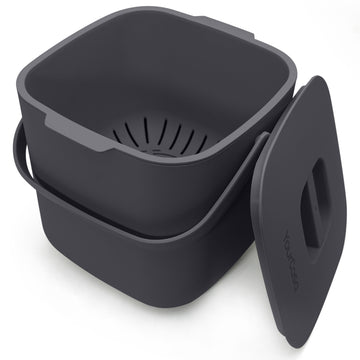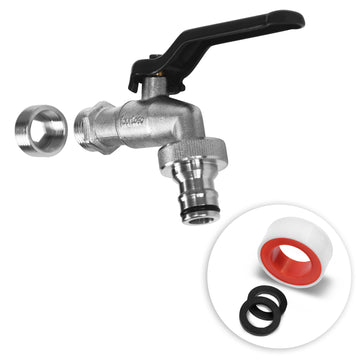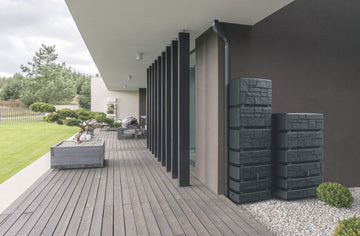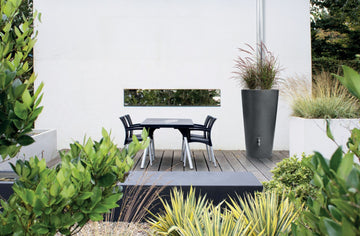Composting in small spaces: Tips for small gardens, apartments and balconies
by Robert Zielinski on May 15, 2024
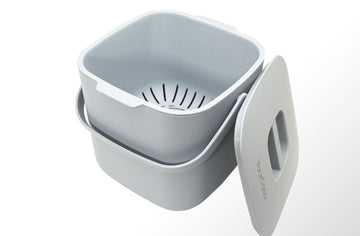
If you compost at home, you not only ensure that you always have good, nutrient-rich soil for your plants , but you also dispose of kitchen and garden waste in the same way - and in an environmentally friendly way. If you don't have much space in your own home or a large garden, you might think that composting is impossible for you. We can reassure you: even in a small space like a balcony, you can compost perfectly well.
How can I compost in a small space? You can compost well in a small space by using a special kitchen composter or a bokashi bucket. These containers are compact and odor-free, ideal for apartments or balconies. Alternatively, there are also small, stackable worm composters that use worms to turn organic waste into compost. Make sure your compost bin has a lid to minimize odors and keep pests away. Turning the compost material regularly speeds up the decomposition process and improves the quality of the final product.
Compostable materials include most organic waste, while meat, dairy products and treated wood should be avoided as they may attract pests or contain harmful chemicals. We'll show you what to look out for when composting in your small garden, apartment or on your balcony .
How do I choose the right compost bin for my apartment or balcony?
Especially if you have little space, choosing the right container is important - because only with the right composter will you be able to compost effectively. We'll tell you what options you have and what you should consider when making your selection. One thing in advance: you should primarily keep an eye on kitchen compost bins. Pay attention to the following factors:
- Size: Before choosing the right compost bin, ask yourself the following questions: How much waste do you generate at home? How much space do you have? Smaller bins are better suited for individuals or small households, while larger ones may be useful for families.
- Material: Compost bins are made of different materials such as plastic, metal or ceramic. Plastic is lightweight and inexpensive, while metal is more durable and often looks better. Ceramic is also nice to look at, but is also more fragile.
- Location: The location of your compost bin should be carefully considered. It should be easily accessible, but it is best to place it in a place where odors are not a problem - even though compost should not normally smell strong and most of YourCasa's compost bins are odor-proof.
Let's briefly return to the location of your mini composter . If you don't have a garden, you basically have two options:
- In the home: Place the compost bin under the sink or in an inconspicuous corner of the kitchen. Make sure the bin is easy to reach and clean.
- On the balcony: Choose a shady, sheltered area to avoid direct sunlight and excessive moisture from rain. This will help regulate the temperature and make the decomposition process efficient.
YourCasa has a large selection of suitable compost bins . In the table below we present you a few of them:
| Model | Size | Characteristics | Price (€) |
| Kitchen composter 6L | 6 liters | Compact, odor-proof, easy to clean, with filter | 34,99 |
| Kitchen composter 7L | 7 liters | Dishwasher safe, odor-proof | 28.99 |
| Kitchen composter 4L | 4 liters | Dishwasher safe, odor-proof | 23,99 |
| Kitchen composter 4L real wood and stainless steel | 4 liters | Easy to clean, odor-proof | 39,99 |
Each of these kitchen composters fits easily into a normal kitchen or on a small balcony. If you have more space, for example on a roof terrace, the EcoFusion might be something for you. This composter for the garden holds a full 450 liters, has ventilation slots for perfect air circulation and has flaps for practical compost removal. And: At YourCasa you can also find normal garbage cans .

Which kitchen waste is suitable for composting in the home?
If you compost in your home, you probably don't have a garden at your disposal - so we'll mainly focus on kitchen waste here. With a few exceptions, you can put almost all waste that arises from cooking into your composter - and thus prevent it from ending up in a landfill and causing direct or indirect damage to the environment.
Good examples of compostable waste are vegetable scraps, fruit peels, coffee grounds and tea leaves . These "green" materials are rich in nitrogen and promote the activity of the microorganisms necessary for the decomposition process. On the other hand, waste such as meat, fish, dairy products and oily foods should be avoided as they can cause bad smells and attract pests.
The balance between "green" and "brown" materials , such as shredded paper cartons or dry leaves that are rich in carbon, is crucial. A good mix of these materials helps to minimize odor and promote efficient decomposition.
Collect the waste that you want to put in the compost later in two separate containers - one green and one brown. When you have enough of both, you can put them in the compost. It is best to cut everything into small pieces beforehand - this will speed up the composting process. Turning the compost contents regularly is also helpful to ensure even decomposition and to avoid overheating or drying out.
How do I avoid odors and pests when composting in small spaces?
Odors during composting are usually caused by the breakdown of waste that is rich in proteins and fats and that you should not put in the compost in the first place: primarily fish, meat and dairy products. Otherwise, you should pay attention to a balanced ratio of green to brown materials in order to keep the nitrogen and carbon content in your composter at the perfect level.
Pests can also become a problem . The following animals in particular like to nest in compost:
| vermin | Solutions |
| Fruit flies | Cover kitchen waste; clean compost bins regularly. |
| Rats/Mice | Keep containers closed; do not use animal products. |
| Ants | Do not place containers on the floor; change location regularly. |
| Mosquitoes | Keep compost dry; avoid water accumulation. |
| Blowflies | Do not leave waste standing for too long; cover compost. |
| Cockroaches | Close compost bins tightly and clean them regularly. |
So, if you keep your compost closed, make sure that no water accumulates and only throw in waste that really belongs there, you should n't have any problems with vermin or bad smells .
How can I best use my home-made compost?
Your compost is ready to use when it looks dark and crumbly and smells earthy . This usually takes a few months, depending on the materials you put into the compost and how you care for the compost bin. Once your compost reaches this state, it is rich in nutrients and ready to promote plant growth in your garden, on your balcony or in your plant pots.
Now you're probably wondering how to best use your compost once it's ready. It's very simple: For houseplants, it's advisable to apply a thin layer of compost to the surface of the soil . This not only promotes growth through a slow release of nutrients, but also improves soil structure and the supply of vital water to your plants.
In addition to being used directly in potting soil, compost can also be used as fertilizer in vegetable gardens . It is particularly valuable for revitalizing exhausted soils and increasing soil fertility. If you regularly mix compost into garden and plant soil, you will ensure the long-term health and vitality of your plants.
| Usage | Advantages |
| Add potting soil | Improves soil structure and nutrient availability. |
| Surface fertilization | Slow release of nutrients promotes growth. |
| Soil improvement | Increases the water retention capacity of the soil. |
| Creating new beds | Provides a nutrient-rich base for new plantings. |
| Fertilizing the vegetable garden | Supports the health and growth of vegetables. |
Conclusion: Why is composting an enriching practice even in small spaces?
Composting in homes or on balconies is not only easy, it is also extremely useful . It reduces kitchen waste, protects the environment and provides nutrient-rich fertilizer for plants. With your own compost you can promote the growth of your plants and improve the quality of the soil wherever you are. Start composting today and experience how even a seemingly small contribution can have a big impact on your immediate environment. Check out the products from YourCasa, discover our range of compost solutions and start your own composting process.


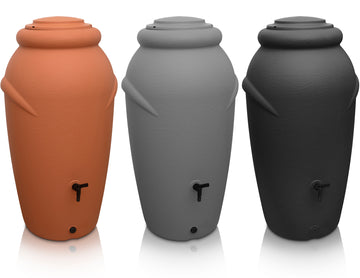
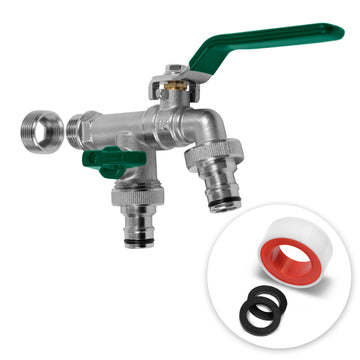
![Drei hohe YourCasa Regentonne 240 Liter [Wellen-Design] - Frostsicher & UV-beständige Gartentöpfe in den Farben Schwarz, Grau und Terrakotta, jeweils mit Drainagesystem für nachhaltige Bewässerung.](http://yourcasa.de/cdn/shop/files/ohnelogo_b8aeecac-557e-4106-a999-e77dcd160209.jpg?v=1707130230&width=360)
